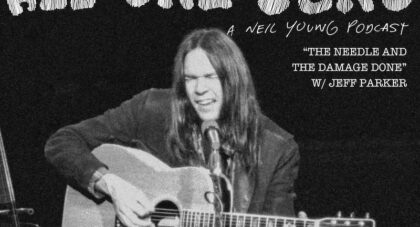In a relatively short period of time, Foxygen has managed to please, vex and elude a lot of listeners. Needlessly so, it seems. Over the course of a afternoon in conversation at member Jonathan Rado’s Los Angeles home, what emerges is that in spite of anyone’s desire to nail down outside influences, Foxygen is about two lifelong friends being on the same page. Almost four years since we last caught up with them, the duo of Rado and Sam France expounded on the conception and execution of their new album, Hang, how they’ve evolved as performers and record-makers, and the misconception that annoys them still.
Aquarium Drunkard: In 2012, when first speaking with us about Take The Kids Off Broadway, you were already plotting the release of We Are the 21st Century Ambassadors of Peace & Magic, but you also said at the time that after that you planned to release a record called … And Star Power and then one called Hang. And now, here we are. So…how long has this record actually been gestating?
Sam France: Well, I guess it’s been a long time.
Jonathan Rado: It’s been probably since around that time. I would say that is pretty much around the time we came up with the title and the idea. Because we had recorded that song [“Hang” from … And Star Power] around that time, three-and a half years ago — the version that’s on that record, before we’d even begun recording for that record. And we knew then that we wanted to call an album Hang as well. That was a fresh idea when we brought it up to you.
AD: So how didactic was that planning? Did that mean that you sort of created a schedule, “we’re gonna do this, then this, then that” or was it more of a fun idea to kick around?
Sam France: Kinda like it’s our schedule, that’s how we do stuff.
Jonathan Rado: We’re lucky we were able to, we always planned on doing it.
AD: From then until the actual recording for this record, how did your vision and conception change?
Jonathan Rado: We actually wrote the songs back then — we had the idea that we wanted to do Hang and that we wanted to do it with an orchestra — that was always the idea, to do it with big arrangements and have it be a complete piece of music. The 21st… album hadn’t even come out yet, so we recorded that, then we started making … And Star Power and focused really intently on that. A lot of these songs were really written during or before Star Power. We had the sound, conceptually, sketched out already.
AD: One of the things that came up when last spoke was that the material you were releasing and performing then had actually be completed for a while, and whether you were already over-it in a way. It seems like you’re still in that boat — it’s not like you could say you’ve had some nice down time in between records — you’re doing the same thing again. How does that feel?
Jonathan Rado: We’re constantly thinking ahead. We’re slightly more caught up than we were at that point. We’re already gestating the next couple of records, the next album at least is starting to form. At that point, back in 2012, we were anxious, we had too many ideas. Too many ideas to even begin to start to make. We’ve gotten a bit older and have caught up with ourselves, we have a more natural schedule but we’re still ahead of the game a little bit.
Only the good shit. Aquarium Drunkard is powered by its patrons. Keep the servers humming and help us continue doing it by pledging your support.
To continue reading, become a member or log in.


